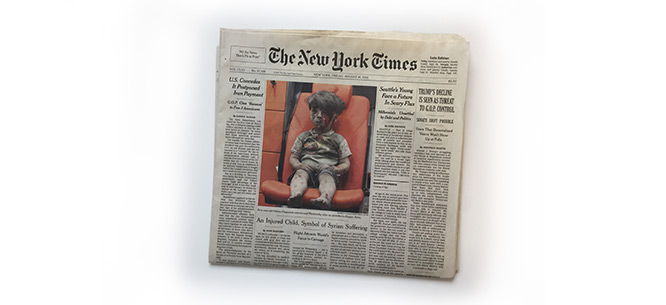The Pain of Others
The Pain of Others
It is sheer sentimentality to ask photographs to do the work of politics and to make the choices that we cannot.

Every day the photographs appear: in newspapers, online, on television, on Twitter and Facebook and Instagram. They show the sadistic horror of the war in Syria. Occasionally, a single photograph—usually of a dead or wounded child—bursts through the deluge of images and, for a moment, is widely seen, widely discussed, and hailed as “iconic.” This is, always, quickly followed by an earnest, albeit repetitive, debate about whether this photograph will help end the war in Syria.
The short answer, and the long answer, is: no.
A photograph can sway public opinion—and even sometimes lead to political action—when the political will to “do something” already exists, at least in nascent form. The photograph clarifies, or supports, a political understanding or commitment that precedes the photo. This was the case with the Spanish Civil War, the American war in Vietnam, and the Bosnian war.
This is not the case with the Syrian war.
Who, exactly, will a photograph of Syrian suffering influence? Barack Obama? Vladimir Putin? (Or his friend, Donald Trump?) Bashar al-Assad? Abu Bakr al-Baghdadi? Ayatollah Ali Khamenei? And while the American public might be moved, even appalled, by these photographs, what would their—our—political demand be? Unlike the case of Vietnam, there is no demand for “out now,” for the United States isn’t exactly “in.” Unlike the case of Bosnia, there is no demand for intervention, no clear idea of what democratic political project we would interfere for. And there is zero domestic support for the price any such intervention would entail. In other words, the genuine emotional distress that photographs from Syria evoke cannot be easily channeled into political action.
It is sheer sentimentality to ask photographs to do the work of politics and to make the choices that we cannot.
Susie Linfield is on the editorial board of Dissent.






